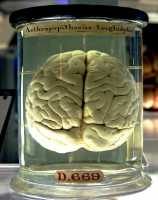
20 Oct Cancer Cells Take Advantage of Brain’s Fatty Environment to Grow
MedicalResearch.com Interview with:

Dr. Qing Chen
Qing Chen, M.D., Ph.D.
Assistant Professor, Immunology, Microenvironment & Metastasis Program
Scientific Director, Imaging Facility
The Wistar Institute
MedicalResearch.com: What is the background for this study?
Response: We are focusing on how a specific type of brain cells, astrocytes, helps the cancer cells from melanoma and breast cancer to form metastatic lesions.
MedicalResearch.com: What are the main findings?
Response: Cancer cells takes advantage of the high fatty microenvironment in the brain to grow.
MedicalResearch.com: What should readers take away from your report?
Response: The brain has a very unique microenvironment and is the least understood organ of the body. More studies needs to be done to understand brain metastasis, tumor lesions growing the brain.
MedicalResearch.com: What recommendations do you have for future research as a result of this work?
Response: The ultimate goal for all cancer research is to treat and cure the disease. Our study suggest PPARg pathway promote cancer cells growth once they get into the brain. However, many other studies show that PPARg inhibit the migration of cancer cells. Therefore, therapeutic strategies will have to context dependent and personalized.
Co-authors: Andrea Watters, Nan Cheng, Caroline E. Perry, Gretchen M. Alicea, Joshua L.D. Parris, Meenhard Herlyn, Maureen E. Murphy, Zachary T. Schug from Wistar and Ashani T. Weeraratna, formerly at Wistar; Ke Xu from Boston University School of Medicine; Ezra Baraban, Anupma Nayak and Xiaowei Xu from the Perelman School of Medicine of the University of Pennsylvania.
Work supported by: National Institutes of Health (NIH) grant T32 CA009171 and grants from Susan G. Komen (CCR17487999), The Jayne Koskinas Ted Giovanis Foundation for Health and Policy and the V Foundation for Cancer Research. Additional funding was provided by the Ching Jer Chern Memorial Award. Core support for The Wistar Institute was provided by the Cancer Center Support Grant P30CA010815.
Citation:
YongKang Zou, Andrea Watters, Nan Cheng, Caroline E Perry, Ke Xu, Gretchen M. Alicea, Joshua L.D. Parris, Ezra Baraban, Pulak Ray, Anupma Nayak, Xiaowei Xu, Meenhard Herlyn, Maureen E. Murphy, Ashani T Weeraratna, Zachary T Schug, Qing Chen. Polyunsaturated Fatty Acids from Astrocytes Activate PPAR Gamma Signaling in Cancer Cells to Promote Brain Metastasis. Cancer Discovery, 2019; CD-19-0270 DOI: 10.1158/2159-8290.CD-19-0270
[subscribe]
Last Modified: [last-modified]
The information on MedicalResearch.com is provided for educational purposes only, and is in no way intended to diagnose, cure, or treat any medical or other condition. Always seek the advice of your physician or other qualified health and ask your doctor any questions you may have regarding a medical condition. In addition to all other limitations and disclaimers in this agreement, service provider and its third party providers disclaim any liability or loss in connection with the content provided on this website.
Last Updated on October 20, 2019 by Marie Benz MD FAAD
